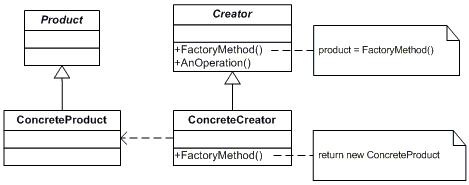As a class developer, you will ordinarily provide class constructors to let users of your class instantiate it. However, a client that needs an object does not or should not know which of several possible classes to instantiate.
Define an interface for creating an object, but let subclasses decide which class to instantiate. Factory Method lets a class defer instantiation to subclasses.
Use Factory Method pattern when

#ifdef Implementation1
class MyProduct : public Product {};
class YourProduct : public Product {};
class TheirProduct : public Product {};
typedef int ProductId;
const int MINE = 1;
const int YOURS = 2;
const int THEIRS = 2;
/*
*/
class Creator {
public:
virtual Product* Create(ProductId);
};
/*
*/
Product* Creator::Create (ProductId id) {
if (id == MINE) return new MyProduct;
if (id == YOURS) return new YourProduct;
// repeat for remaining products…
return 0;
}
/*
*/
class MyCreator : public Creator {
public:
virtual Product* Create(ProductId);
};
/*
*/
Product* MyCreator::Create (ProductId id) {
if (id == YOURS) return new MyProduct;
if (id == MINE) return new YourProduct;
// N.B.: switched YOURS and MINE
if (id == THEIRS) return new TheirProduct;
return Creator::Create(id); // called if all others fail
}
/*
*/
#endif
#ifdef Implementation2
/*
*/
class Creator {
public:
Product* GetProduct();
protected:
virtual Product* CreateProduct();
private:
Product* _product;
};
/*
*/
Product* Creator::GetProduct () {
if (_product == 0) {
_product = CreateProduct();
}
return _product;
}
/*
*/
#endif
#ifdef Implementation3
/*
*/
class Creator {
public:
virtual Product* CreateProduct() = 0;
};
/*
*/
template <class TheProduct>
class StandardCreator: public Creator {
public:
virtual Product* CreateProduct();
};
/*
*/
template <class TheProduct>
Product* StandardCreator<TheProduct>::CreateProduct () {
return new TheProduct;
}
/*
*/
class MyProduct : public Product {
public:
MyProduct();
// …
};
StandardCreator<MyProduct> myCreator;
/*
*/
#endif
/*
*/
#include “C++/MazeParts.H”
/*
*/
class MazeGame {
public:
Maze* CreateMaze();
/*
*/
// factory methods:
/*
*/
virtual Maze* MakeMaze() const
{ return new Maze; }
virtual Room* MakeRoom(int n) const
{ return new Room(n); }
virtual Wall* MakeWall() const
{ return new Wall; }
virtual Door* MakeDoor(Room* r1, Room* r2) const
{ return new Door(r1, r2); }
};
/*
*/
Maze* MazeGame::CreateMaze () {
Maze* aMaze = MakeMaze();
/*
*/
Room* r1 = MakeRoom(1);
Room* r2 = MakeRoom(2);
Door* theDoor = MakeDoor(r1, r2);
/*
*/
aMaze->AddRoom(r1);
aMaze->AddRoom(r2);
/*
*/
r1->SetSide(North, MakeWall());
r1->SetSide(East, theDoor);
r1->SetSide(South, MakeWall());
r1->SetSide(West, MakeWall());
/*
*/
r2->SetSide(North, MakeWall());
r2->SetSide(East, MakeWall());
r2->SetSide(South, MakeWall());
r2->SetSide(West, theDoor);
/*
*/
return aMaze;
}
/*
*/
class BombedMazeGame : public MazeGame {
public:
BombedMazeGame();
/*
*/
virtual Wall* MakeWall() const
{ return new BombedWall; }
/*
*/
virtual Room* MakeRoom(int n) const
{ return new RoomWithABomb(n); }
};
/*
*/
class EnchantedMazeGame : public MazeGame {
public:
EnchantedMazeGame();
/*
*/
virtual Room* MakeRoom(int n) const
{ return new EnchantedRoom(n, CastSpell()); }
/*
*/
virtual Door* MakeDoor(Room* r1, Room* r2) const
{ return new DoorNeedingSpell(r1, r2); }
protected:
Spell* CastSpell() const;
};
/*
*/